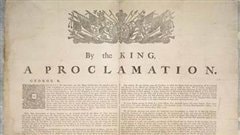The Royal Proclamation was issued on October 7, 1763 by King George III of England. It was a major turning point in Canada’s history, acknowledging Indian rights to the land. For Canada’s First Nations, it is the basis for many of their current land claims.
This year marks the 250th anniversary, and a day of action is planned. A delegation of people including native war veterans, led by Chief Perry Bellegarde of the Little Black Bear First Nation of Saskatchewan, is in London, England this weekend getting ready for the occasion on Monday. There will be a gathering at the statue of King George III on Pall Mall. Across Canada a variety of events are planned.
The Royal Proclamation was the basis for 500 treaties negotiated with First Nations in the 18th and 19th centuries, but with the dawn of the 20th century the relationship between First Nations and the government soured and the law suffered.
In 1973, however, the Canadian court upheld the legal obligations under the Royal Proclamation. Since that time 17 treaties covering one-fifth of Canada’s land mass have been signed between First Nations and the Canadian government.
But there are many contentious issues. The birth last year of the Idle No More movement demonstrated that First Nations youth are intent on standing up for their rights..
This week the leader of the Assembly of First Nations had a warning for Stephen Harper. In an interview yesterday with the Calgary Herald newspaper, Sean Atleo discussed the growing conflicts over resource development: “It’s brought us to this moment of collaboration or collision. It’s a very clear moment of decision of what the next steps are going to look like.”
Atleo said, “A ‘collision’ might well involve further legal action or possibly even conflict,” He went on to describe the current legal wrangling, “On average, we’ve got 100 aboriginal title and rights court cases that clog up the courts. You know, highly conflict-filled,” Atleo said. When resource development has proceeded without First Nations consent, it has resulted in “conflict on the ground,” he added.
Next week the United Nations Special Rapporteur will be in Canada visiting aboriginal communities, and we can expect that many of the issues and conflicts, and perhaps some of the achievements, will be in the spotlight
Carmel Kilkenny spoke with Tom Borrows, a professor of Law at the University of Minnesota Law School in the United States, to find out more about the importance of the Royal Proclamaiton in Canada’s past and its future.
butListen there has been little media coverage of the event in Canada to this point.







For reasons beyond our control, and for an undetermined period of time, our comment section is now closed. However, our social networks remain open to your contributions.